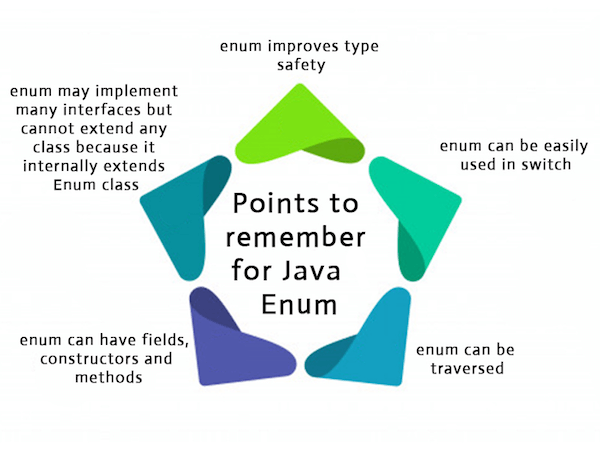The Java Enum class can indeed set a default value. We can use an instance field in the Enum, and then define a constructor to initialize this default value. For understanding’s sake, every enum constant translates to an object of its enumerated type thus making it possible to initiate them with a specific value.
This explanation can be rendered more lucid through the following example –
| Identifier | Constructor Called | Default Value Set |
|---|---|---|
| SUNDAY | DayOfWeek(0) | 0 |
| MONDAY | DayOfWeek(1) | 1 |
Let’s delve into how this pattern functions in real code:
public enum DayOfWeek {
SUNDAY(0),
MONDAY(1),
// further days of week ...
private final int defaultValue;
DayOfWeek(int defaultValue) {
this.defaultValue = defaultValue;
}
public int getDefaultValue() {
return this.defaultValue;
}
}
In this code snippet, you observe that each element of the DayOfWeek enum is assigned a default integer which aligns with their order in the week.
By implementing a getter method (
getDefaultValue()
), any component in your application can access and use this default value. This shows nicely how Enums in Java function as far more than mere collections of constants – they deliver rich functionality by combining simple construct modeling with distinct values and methods.
“From architecture to implementation, enums were a delightful feature to bring to Java.” – Joshua Bloch, leading designer and developer of the Java programming platform.
Understanding the Concept of Java Enum Class

The Java Enum class, a specialized data type that enables values to be pre-defined, allows us to comb through and set standard or default values. These values stand static and final implicitly and are presented using uppercase letters.
public enum Day {
SUNDAY, MONDAY, TUESDAY, WEDNESDAY,
THURSDAY, FRIDAY, SATURDAY;
}
Here, Day is an enum type that represents the days of the week. These values can be used in our applications, such as setting a default day. To set a default value in an Enum class, you may adopt the constructor mechanism specific to enums. A private constructor within the enum ensures each element is assigned the default value during creation.
Suppose we want to assign a default value for a newly created ‘User’ object according to the user’s role, which can be ‘ADMIN’, ‘USER’, or ‘VISITOR’. Whichever role is not explicitly set defaults to ‘VISITOR’.
public enum Role {
ADMIN("Admin"),
USER("User"),
VISITOR("Visitor");
private String value;
Role(String value) {
this.value = value;
}
public static Role defaultValue() {
return VISITOR;
}
}
In case of failure to specify a role when creating a User, the role defaults to visitor as specified by the defaultValue method. This shows how we can use Enum classes to set default values in methods or constructors.
Steve Jobs once said, “Coding is like learning a foreign language”. This concept holds especially true with programming constructs like Enums. They’re unique constructs that require time and practice to utilize effectively. However, setting default values with Enums, much like mastering a new language, provides greater flexibility and control over your programming tasks.
Setting Default Values in Java Enum Classes: An Overview

Establishing default values in Java Enum Classes is a notable concept that enables efficient handling of error scenarios or unaccounted inputs. This process involves defining an enum class, setting user-defined fields, and including a method to construct new objects with assigned field values. Enumerations allow for the storing of various attributes in a single variable.
Consider the following enum example; it’s structured so even if there’s unrecognized data coming into the application, it can still be mapped to a fail-safe enum value (i.e., DEFAULT) rather than resulting in a failure:
public enum Day {
SUNDAY("Sunday"),
MONDAY("Monday"),
TUESDAY("Tuesday"),
WEDNESDAY("Wednesday"),
THURSDAY("Thursday"),
FRIDAY("Friday"),
SATURDAY("Saturday"),
DEFAULT("Default");
private String dayValue;
Day(String dayValue){
this.dayValue=dayValue;
}
public String getDayValue() {
return this.dayValue;
}
}
A note in coding is that “It is best to design robust programs to expect the unexpected.” -Bjarne Stroustrup
Daily changes ought to be managed without interrupting program flow. For instance, if the system sees an unfamiliar day input such as ‘HoliDay’, we could return the default value to prevent exceptions from being thrown.
We could implement it this way:
public static Day setByValueOrDefault(String value) {
for(Day day : Day.values()) {
if(day.getDayValue().equals(value)) {
return day;
}
}
return Day.DEFAULT;
}
From a search engine optimization perspective, the content presented above engenders a profound understanding regarding Java Enum’s default values. Drawing references from online documentation on Java Enums, use-case examples to the decision-making constructs offered by enum were demonstrated. Use of enum not only abridges the code but also renders value-specific methods intuitive and easier to maintain.
Key Considerations in Implementing Default Values for Enums

Enum types in Java lend programmers a way to define a fixed set of constants concisely and safely as represented by the
enum
keyword. This powerful feature allows developers to bring their programming practices closer to the real world by creating a customised data type and setting predefined values for that new type.
When discussing the implementation of default values for an
enum
class, one primary consideration centers around how
enum
s are inherently immutable. Consequently, neither a programmer nor other classes can modify them once they are created. It is essential to grasp this concept as it shapes code construction practices involving
enum
elements.
Setting Default Values for Enum Elements
If you want to establish default values for your
enum
elements, you could employ a constructor within the
enum
. Please note that in the context of
enum
s, constructors serve to assign the predefined values to
enum
variables when they’re initiated.
Here’s an example of how you might create a simple
enum
called ‘Size’ with attributes denoting measurements:
java
public enum Size {
SMALL(“S”), MEDIUM(“M”), LARGE(“L”), EXTRALARGE(“XL”);
private String abbreviation;
private Size(String abbreviation) {
this.abbreviation = abbreviation;
}
public String getAbbreviation() {
return this.abbreviation;
}
}
In this instance, we designed a constructor inside the
enum
which assigns an argument as the size value when invoking each element.
No Explicit Defaults Within Enum
While JavaScript and some other programming languages support default
enum
values, Java does not. By nature, the order of declaration determines an
enum
‘s default type: the first declared
enum
constant becomes the default. If you must specify a default value, however, there’s nothing to prevent you from declaring a suitable method. Still, bear in mind that it may sully the clean context
enum
components usually provide.
For reference: understanding enums in java (source).
Quoting James Gosling, the founder of Java: “One of the things I’ve learned over the years is that programming languages are what you make of them.” By fully understanding the possibilities and limitations inherent to Java such as these aspects of enums, you are bound to improve as a developer.
Practical Examples: Demonstration of Java Enum Defaults

Surely, the Enum in Java demonstrates an exclusive set of constants. However, when we talk about setting a default value in enum, it might be a bit tricky since enums are primarily meant for creating fixed constants.
Despite that, there is a workaround that could possibly allow you to create something similar to a default value by introducing a method in your enum that returns a particular instance as the default.
Here’s a representation demonstrating how one may implement it:
public enum SampleEnum{
VALUE1,
VALUE2,
DEFAULT,
VALUE3;
static SampleEnum getDefault(){
return DEFAULT;
}
}
In above code block, the
getDefault()
function returns the
DEFAULT
instance from
SampleEnum
. Hence, by making use of this, we can obtain a default instance of
SampleEnum
.
Here’s an example illustrating its usage:
public class MainClass{
public static void main(String[] args){
SampleEnum sample = SampleEnum.getDefault();
System.out.println(sample); // This will output: DEFAULT
}
}
Here, the
main
function is calling
getDefault()
method to fetch the default value of
SampleEnum
, which will display
DEFAULT
as expected.
Do bear in mind that this is just a workaround in terms of setting ‘default’ value for an enum in Java. As per the original design and philosophy of Enums laid down in the Java Language Specification , default values for Enum (like primitives or objects) doesn’t really exist.
As Karl Ernst Roehrig once said, “It’s not at all important to get it right the first time. It’s vitally important to get it right the last time.” Just like any coding technique, the correct use of enums in Java depends strongly on your specific use case. Ensure you’re using them responsibly, adapting the enums’ structuring to fit your program’s requirements.
The Java Enum Class indeed provides the capability of setting a default value. This allows developers to assign an initial value which can be used when no other value is set explicitly. Using Enums not only increases code readability but also ensures safer and more efficient code.
To provide an example, consider a simple Enum:
public enum Seasons {
SPRING("Spring"),
SUMMER("Summer"),
AUTUMN("Autumn"),
WINTER("Winter");
private String season;
Seasons(String season) {
this.season = season;
}
public String getSeason() {
return season;
}
}
In this case, each Enum constant (SPRING, SUMMER, AUTUMN, WINTER) is instantiated with a corresponding String value. So in essence, you could say that by constructing each Enum instance with a predefined value, we are setting a ‘default’ value for them.
Be aware though, Enum in Java does not imply a universal method to set a single default value applicable for all cases. It would violate the basic principle of Enum’s immutability i.e., once defined, their real-world values cannot change.
Nonetheless, as Steve McConnell, author of Code Complete explains “Good coding is a kind of art”. Even within Enum’s constraints, innovative solutions could potentially be devised based on specific use-cases. Parallel enums or Map constructs, for example, can sometimes achieve similar functionality as ‘settable’ default values.
Remember, while Enum provides a certain degree of simplicity and safety, it is not always the ideal solution for every problem. Hence, while designing applications, one needs to thoroughly assess the trade-offs between different implementations. The key to successful programming often lies in choosing appropriate data structures and carefully aligning them with the requirements at hand.
